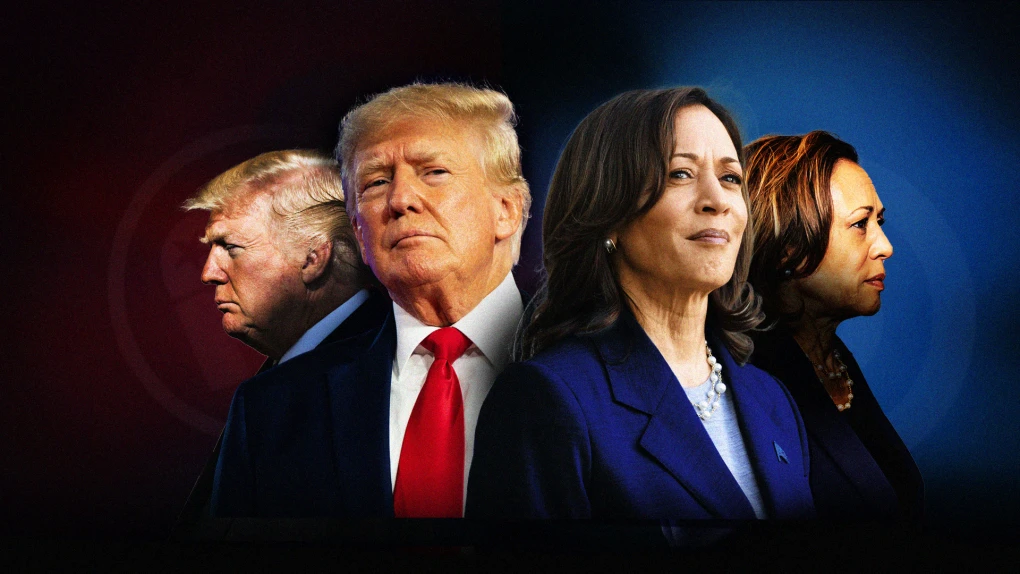
November 5 is the presidential election day in the United States, and it will also be a day that will have a profound impact on the global situation for the next four years. In this upcoming U.S. election, the choices of voters will affect the policy direction of the United States, China's policy response, as well as the trends of cryptocurrencies and the stock market.
This explainer post will introduce in detail the election mechanism, timeline, winning probability, and the public's views on them. Through these analyses, whether you are an enthusiastic voter or an investor interested in the cryptocurrency market, you will have a deeper understanding of the current political situation and its potential impact on the future economy.
Background: Why did Trump win the U.S. presidency in 2016 with fewer votes?
The U.S. presidential election is held every four years. First, each state will hold primaries or caucuses, where voters vote to choose the candidates they support. Based on the primary results, the major parties will hold national conventions to formally nominate their candidates. The current leading candidates are Donald Trump of the Republican Party and Kamala Harris of the Democratic Party.
The official presidential election is held on the first Tuesday in November (November 5 this year in the U.S. local time). In this election, voters actually vote for electors (similar to representatives of the people), rather than directly voting for one of the two candidates. Each state is allocated a number of electors based on its population, and the entire country has a total of 538 electors. Most states adopt a "winner-take-all" system, which means that the candidate who receives the most votes in a state will receive all of that state's electoral votes.
This is the first point to note in the U.S. presidential election: In the U.S. presidential election, voters vote for electors, and these electors are usually representatives of a particular party. The political stance of the electors, and whether they support Trump or Harris, is generally clear before the election, so the voting results can often directly reflect which candidate will receive the support of the majority of electors, or even all of the electors in a state, which is the traditional concept of "red states" and "blue states".
For example, if Elector A, representing the Democratic Party in California, receives the most popular votes in that state, then all of California's electoral votes (a total of 55 electoral votes) will be attributed to the Democratic Party candidate Harris, regardless of the political stance of the other electors.
Therefore, by tracking the allocation of electoral votes on November 5, we can usually accurately predict the candidate who will ultimately become president, and we will see this result next week.
To win the presidency, a candidate needs to win at least 270 electoral votes. The election results are usually officially confirmed at the Electoral College meeting in December, when the electors will vote to elect the new president. The second point to note is that although electors generally vote according to the will of the voters (i.e., their previously announced political stance), in some cases individual electors may "betray" their candidate and vote for another candidate. While this situation is relatively rare, it does exist, so in theory, the final vote of the Electoral College may not be entirely equivalent to the voters' votes.
In the 2016 U.S. presidential election, Hillary Clinton received more popular votes, about 65 million votes, accounting for 48.2% of the total votes. Donald Trump, on the other hand, received about 63 million votes, accounting for 46.1% of the total votes. Although Hillary led in the popular vote, Trump won more electoral votes and was ultimately elected president with a 304 to 227 electoral vote result.
The final electoral vote result this year will likely be released around late night U.S. local time on November 5, which is around the afternoon of November 6 Beijing time.
Trump vs. Harris: What are the odds?
Currently, in most authoritative polls, whether it's media leaning towards the Democratic Party, media leaning towards the Republican Party, or neutral institutions, Harris still has an advantage, but the advantage is only a few percentage points. According to the statistics of the neutral media Project 538, the average of the major polls as of November 1 shows that Harris has a 48.0% chance of winning, while Trump has a 46.8% chance. The results of other data statistics websites are also similar, such as the New York Times' result of 49% for Harris and 48% for Trump; 270 to win's result of 48.4% for Harris and 47.2% for Trump.
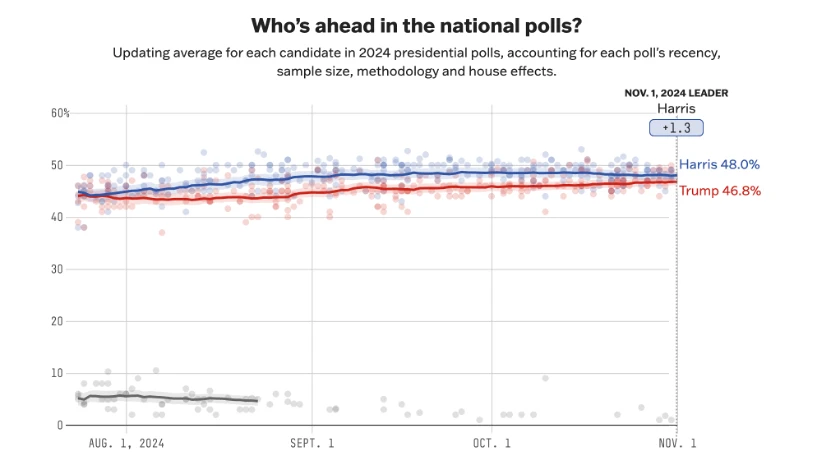
Harris leads the polls by an average of 1.3%. Source: Project 538
Previously, the results compiled by Fox News (leaning towards the Republican Party) and CNN (leaning towards the Democratic Party) also corroborated this conclusion.
This result is somewhat at odds with the current results on the cryptocurrency prediction platform Polymarket. As of the publication of this article, the total market capitalization of this prediction market has reached $2.38 billion, and Trump's winning probability has declined slightly, while Harris' winning probability has increased correspondingly. It can be seen that the Polymarket market has been moving closer to the poll results over the past week, although Trump still firmly occupies the main position.
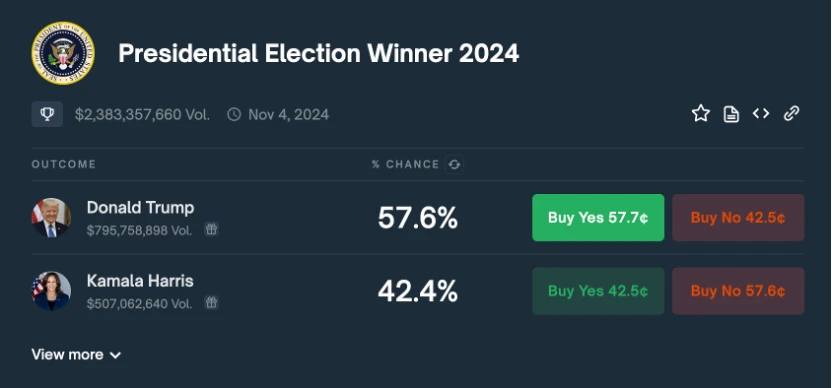
Presidential election prediction on Polymarket. Source: Polymarket
Juicy news: Zuckerberg switches sides, Harris' Twitter account attacked
As the election situation has developed so far, many interesting things have happened. While business tycoons like Musk openly support Trump, the "apology letter" that Meta CEO Zuckerberg wrote to the Republican Party has caused an uproar across the internet.
According to Sina Finance, on August 26, Zuckerberg wrote a letter to Jim Jordan, the Republican chairman of the House Judiciary Committee, stating that he would remain "politically neutral" during this U.S. election cycle and stop donating to local government elections to avoid being perceived as having political bias. Previously, he was widely regarded as a staunch supporter of the Democratic Party, and this letter may be his "letter of allegiance" to the Republican Party.
He also publicly criticized officials in the Biden administration for "constantly" pressuring Facebook in 2021 to censor posts related to the pandemic. Zuckerberg said he regretted that the company had succumbed to these demands. Some even believe that it is because he has discovered trends in the Facebook opinion center that he has switched to the Republican Party.
When the House Judiciary Committee X account released this letter, it said: "Mark Zuckerberg admits three things in this letter - first, the Biden-Harris administration 'pressured' Facebook to censor Americans; second, Facebook censored Americans; and third, Facebook suppressed news about Hunter Biden's laptop." According to Bloomberg, the authenticity of this letter has been confirmed by Meta.
Secondly, on the X platform today, there is an endless debate, and the comments on the candidate Harris' Twitter are almost unanimously criticizing her. On her latest post "I will be a president for all Americans," the comments are almost all one-sided: "You won't be a president for any Americans," "You won't even become president," "You can't even be a vice president for all Americans," people say like this.

Harris' Twitter comments, source: X
Almost all of Harris' tweets have this kind of tone, similar to Trump in 2016. Some netizens believe that the only reason to vote for Harris is "not liking Trump".
Meme Trend: Does Harris' Meme Have a Chance?
Currently, the largest Meme coin MAGA of the Trump concept has maintained a range between $3 and $4, with fluctuations but not too large, seemingly waiting for the final election results to be announced. This sideways trend has been going on for about two weeks.
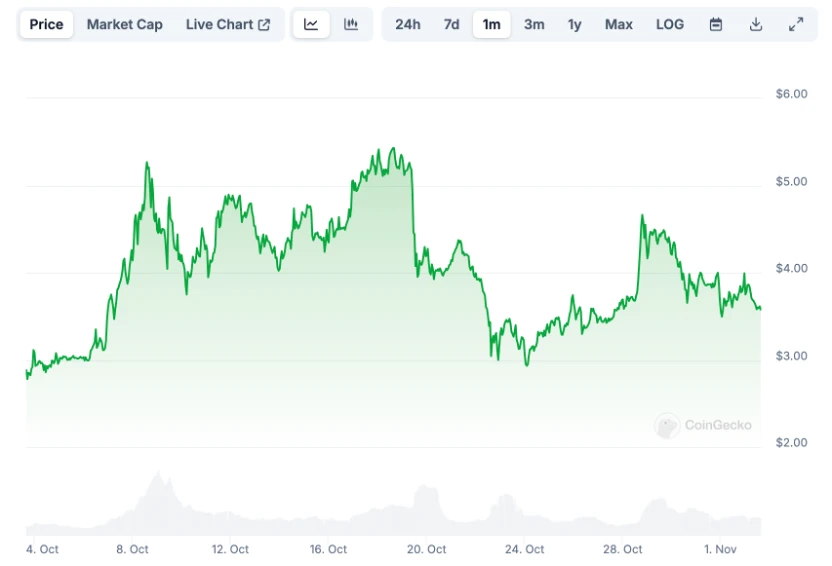
MAGA trend, source: Coingecko
In contrast, Harris' recent Meme coin concept has started to rise, with KAMA's short-term surge reaching about 20%, from around $0.006 previously to around $0.0099 now, and the market capitalization has also increased, reaching $9.966 million, although it is still small compared to Trump, but this may also be a reflection of the increase in this market. After all, the Trump concept is relatively more mature, and there are also various Non-Fungible Token concepts attracting hot money, the room for growth of Harris-related concepts is relatively larger.
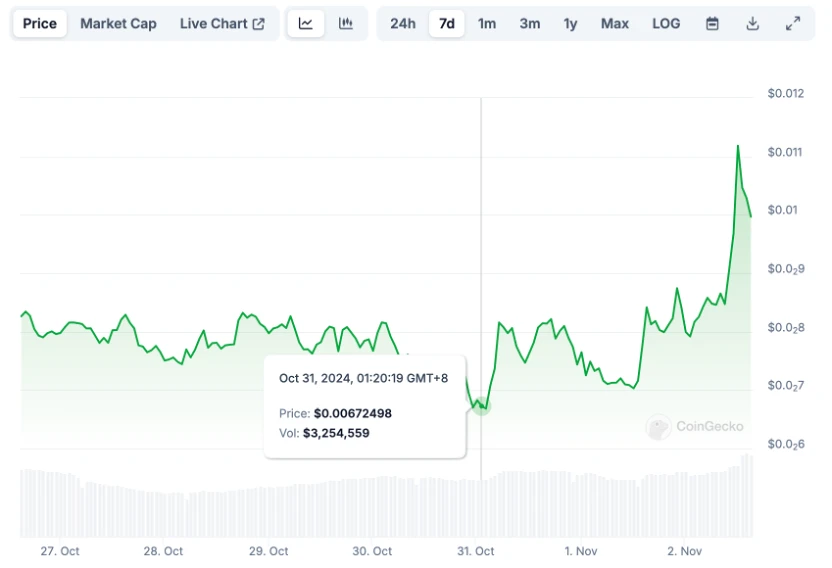
KAMA trend, source: Coingecko
Here, Odaily Planet Daily reminds readers that Meme has large fluctuations, and the current presidential election will be the biggest fluctuation in the short term, so there is a high possibility of a "Sell the news" event, that is, the victory of a certain candidate may not lead to the expected surge in Meme tokens, but rather the collective withdrawal of whale addresses, please pay attention to the risks.
However, in terms of the changing international situation, unless there are larger events that disrupt expectations in the future, including but not limited to: electors betraying their party and causing the final December election result to change from the "fait accompli" result in November, a certain candidate and their party being found to have committed election fraud, resulting in the result being invalidated, or the occurrence of the previous "storming of the Capitol" incident, or a certain candidate following in the footsteps of Kennedy, the election result will be the final expectation release for Meme coins in the short term.
Timeline of the US Election so far
February 2: A judge in Washington, D.C. indefinitely postponed Trump's election interference trial.
March 4: The U.S. Supreme Court unanimously ruled in Trump v. Anderson that Colorado's and Illinois' and Maine's proposals to remove Trump from the ballot under the Fourteenth Amendment were unconstitutional.
May 30: Trump was convicted on all 34 counts in his New York trial, becoming the first U.S. president to be convicted.
July 1: The U.S. Supreme Court ruled 6-3 in the Trump case, dividing along ideological lines, that Trump's actions within his core constitutional powers are absolutely immune, that his official actions outside the outer boundaries of his official responsibilities are presumptively immune, and that his unofficial actions are not immune. Trump's sentencing date in New York was postponed from July to September 2024, and the trial dates for Trump's other cases may also be postponed to review the applicability of the Supreme Court ruling.
Since July 1, more than 20 representatives have called on Biden to withdraw from the race.
July 13: Trump was assassinated at a campaign rally in Butler, Pennsylvania, shot in the ear. A bystander and the shooter were killed, and two others were injured.
July 15: The 2024 Republican National Convention was held in Milwaukee, Wisconsin. Trump announced U.S. Senator JD Vance as his vice presidential candidate, and was then confirmed as the Republican presidential candidate.
July 17: Biden stated that if he is formally diagnosed with a medical condition, he will consider withdrawing from the race. Biden's COVID-19 test result was then positive.
July 21: Biden announced his withdrawal from the race, initiating the "emergency transition process" to allow for the Democratic nomination. Vice President Kamala Harris announced that she would run for president.
August 6: Kamala Harris announced that Governor Tim Walz would be her vice presidential candidate.
September 15: A shooting incident occurred while Trump was playing golf at the Trump International Golf Club in West Palm Beach, Florida. Trump was unharmed in the incident and was evacuated by the Secret Service.
October 29: Biden, through a video call at a Trump rally in Madison Square Garden, referred to Trump's supporters as "trash", which was rebutted by Harris. This was seen by many as potentially damaging to the Democrats' efforts to attract undecided voters, and also made a large number of Trump-supporting Americans feel marginalized.
November 5 (the first Tuesday in November): Election Day.








